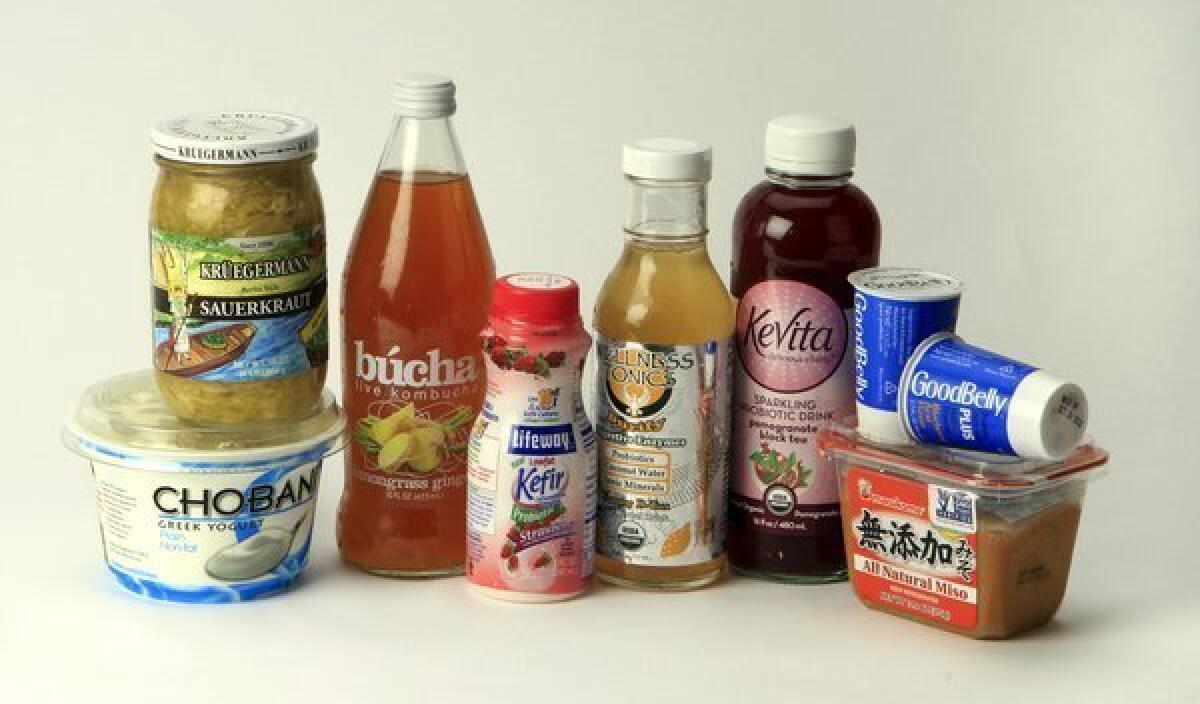Probiotics: A gut-check on bacterial health

- Share via
A fascinating, if disconcerting, fact: More than 100 trillion so-called good bacteria thrive in or on the human body. A sizable chunk of them maintain residence in the human digestive tract. Probiotics, live microorganisms that benefit their human host, are among these beneficial bacteria.
Probiotics are also found in foods and supplements, and when consumed they change how the immune system responds to “bad” bacteria.
“Probiotics seem to enhance the intestinal flora and promote a healthier gut environment,” says Jeannie Gazzaniga-Moloo, a registered dietitian in Sacramento and a spokeswoman for the Academy of Nutrition and Dietetics. Scientists don’t know exactly how probiotics work, but they may also produce anti-microbial substances that destroy harmful microorganisms and stimulate an immune response.
Even though probiotics-infused foods may seem like a modern phenomenon, the idea that consuming living microorganisms could improve health was introduced more than 100 years ago. That’s when Elie Metchnikoff, a Nobel-winning scientist, proposed the idea in his book, “The Prolongation of Life: Optimistic Studies.”
“Certain dairy products, especially yogurt, contain probiotics naturally,” Gazzaniga-Moloo adds, but more recently probiotics have been added to juice, cereal, cookies and more. There are also dozens of probiotic supplements — capsules, tablets and powders — on the market.
Why are food manufacturers adding bacteria to foods that don’t contain them? Some studies suggest that probiotics may help prevent and treat vaginal yeast infections and urinary tract infections, may prevent eczema in children and may reduce the severity and longevity of colds and flu. Other studies have shown definitively that people who are suffering from antibiotic-associated diarrhea benefit from consuming probiotics. Most recently, an analysis that appeared in the May issue of the Journal of the American Medical Assn. found that people who are suffering from diarrhea because they are taking antibiotic medications may reduce the risk of diarrhea by 42% if they consume probiotics. While some advocates claim that probiotics reduce the symptoms of irritable bowel syndrome and Crohn’s disease, the evidence doesn’t yet bear this out. Nor has the U.S. Food and Drug Administration approved any health claims for probiotics.
“I have clients who swear that once they start eating more foods with probiotics they have less bloating and gastrointestinal discomfort, fewer colds and flu,” says Gazzaniga-Maloo.
As we start to stare down cold and flu season, a 2009 study that was published in Pediatrics is worth revisiting. The study, which was funded by a company that makes products with probiotics, compared two groups of kids, 326 total, ages 3 to 5, who drank milk with either Lactobacillus acidophilus or Bifidobacterium animalis or plain milk twice a day. The kids who consumed the probiotics-infused milk ultimately got half as many fevers and fewer runny noses than the kids who drank plain milk. Their symptoms also didn’t last as long, they took fewer prescriptions and missed fewer days of school than the kids who drank the plain milk.



